In our 39th edition of the Donut Dollie Detail, Cathie tells how her Aunt’s work with the American Red Cross prompted her to join the “club mobile program” in South Korea, how she was one of the few Donut Dollies who actually served donuts to the men, and that she got back so much more than she gave from the men in Korea.
Please share the Donut Dollie Detail with family, friends and veterans you may know, and make sure to like/follow us on Facebook to learn when the next edition is posted.
Please meet Red Cross Donut Dollie Cathie Snyder Rubins…
What prompted you to join the SRAO (Supplemental Recreation Activities Overseas) program and want to go to Korea?
I graduated from college in June, 1972 and had no idea what I wanted to do with my life, career-wise. My aunt was then National Director for Service to Military and Veterans Hospitals at the American Red Cross in Washington, DC, and suggested that their “clubmobile program” might give me a chance to sort myself out. Maybe she thought it might mature me a little too. I had never been to Asia and that sounded interesting too.
When and where were you stationed in Korea? Did you go by a nickname?
In July, 1972 I was stationed at Camp Casey in South Korea for a couple of months, then was promoted to unit director at Camp Howze and served there until February, 1973, at which time they were shutting down the Donut Dollie program and I was transferred to Walter Reed Army Medial Center in Bethesda, MD to be a Recreation Therapist. I was known as Cathie while serving in Korea.
What was a routine day like in Korea?
Our office was right next to the hooch we lived in at Camp Casey, so we fell out of bed, into our uniforms and walked over to the office. I was assigned the task of managing supplies for the bakers at Camp Casey, so sometimes I would inventory their stuff. Eventually I discovered that they were selling the chocolate we bought for the icing for our Friday donuts on the black market – it was astounding how much chocolate we were going through! But the bakers were usually finished frying the donuts by the time we got in, and had all the bags of donuts ready to go. We would call each unit we were supposed to visit that day, to confirm they weren’t out in the field or otherwise unavailable, and then head out in our deuce and a half or jeep or whatever vehicle we had that day. At Camp Casey, we travelled by helicopter to some of our stops . At Camp Howze, there was a weekly stop at “Magic Mountain,” a radio installation, where they had to come down the mountain and pick us up in their jeep. Often we ate at the mess halls, and at Thanksgiving and Christmas we split up so we could eat the holiday meal with several units – I ate Thanksgiving turkey up in the DMZ in 1972. We were a small unit at Camp Howze (just 4 of us) and became good friends with the men who drove us.
Did you ever have any “close calls” either on base or in any vehicles?
No – our drivers were always soooooo careful with us! They seemed to love the assignment.
Were you ever injured while in Korea?
No.
What was it like to visit the soldiers in the hospitals?
I only visited one MASH unit in Korea, but Walter Reed was a difficult, amazing experience, as I was assigned pediatrics (children dying from fatal diseases), oncology (adults dying from cancer), and orthopedics (guys with amputations). I remember one soldier who had stepped on a land mine and had both feet blown off; his hobby before serving had been square dancing. That was a big wake-up call to me about how hard life could be.
How was the transition returning home to the United States?
OMG, getting into the San Francisco airport, I was astounded to see so many “round-eyes!” It was so weird after having been such a rarity for almost a year. Also, American people looked so fat to me! (And they still do.)
What would you like people to remember and understand most about the women who served?
Everyone (both the Dollies and the men we served) had a different reason to be there and came from different backgrounds, but I learned that even though we are all different in some ways, we are more alike than we are different. The women I served with wanted to be useful and kind, and that’s a pretty good goal (and unusual these days).
How do you feel Veterans think of your time having served with them? Have any Veterans expressed their feelings to you directly?
I think the Donut Dollies in Vietnam must have been an amazing sight to those guys and that the Vets thought they were extremely brave to go. I have never spoken to any vets about my time as a Donut Dollie. I imagine they would think I was lucky to have all the options I did, and maybe silly to go to South Korea. I remember meeting guys in Korea who had been given a choice by the judge: the Army or jail. OK, I had waaaaaaay better choices than that.
What are your fondest or most interesting memories of your time serving in Korea?
I loved the women I served with – they were an energetic, curious group. I had some not so great experiences in Korea, too, but all in all I learned a tremendous amount and feel it has enriched my understanding of people, the world and myself.
Closing thoughts…
Who knew Red Cross was doing so much good just by sending out a bunch of friendly, nurturing faces? It’s led me, in my sixties, to start standing up at ball games when they honor those who served with the military. I was always proud to be able to think that I had served (sort of), as I came from a family where EVERYONE had been big-time military during WWII – an uncle was on staff at the Pentagon, other uncles were commanding troops in Europe, my aunt was career Red Cross, acting as Eleanor Roosevelt’s on-site guide during her visit to the Philippines and eventually retiring as national director of service to military hospitals. My mom and dad met in Australia where they were both on R&R from the Philippines, her with Red Cross doing social work and him as an Army officer, building fuel dumps for planes! But even though I was my family’s resident hippy peacenik, I was forgiven my disinterest in a military career. But now I know that’s my service wasn’t nothing either. For the men to see a friendly face, in a ward or a war zone or when they just needed help and didn’t know who else to ask, that’s what the Donut Dollies were there for, and I got back so much more than I gave, each time.
PLEASE NOTE: THERE ARE 38 PREVIOUS EDITIONS OF THE DONUT DOLLIE DETAIL THAT CAN BE SEEN HERE, JUST SCROLL DOWN TO READ EACH (AT THE BOTTOM, YOU’LL SEE A LINK TO GO TO THE NEXT PAGE OF DONUT DOLLIE DETAIL FEATURES)
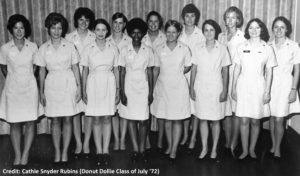

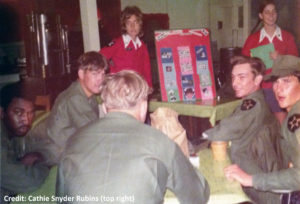
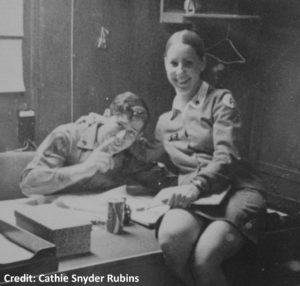
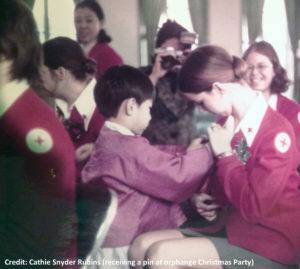
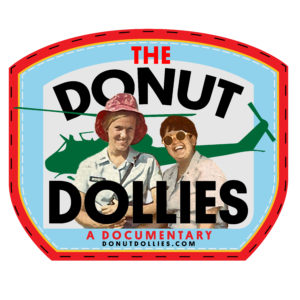
Be First to Comment